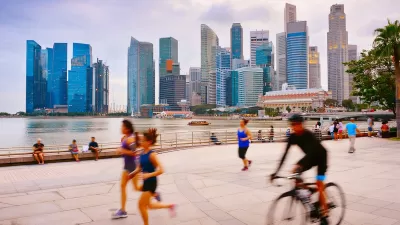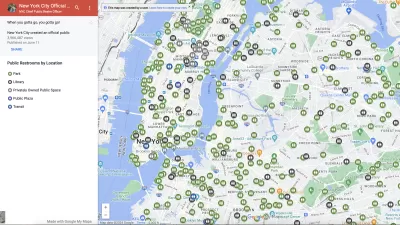Richey Piiparinen explores the "original sin" of the quest for urban “livability” - economic development - and examines what the pitfalls are when cities are designed for high-valued consumers rather than people.
Piiparinen wades into the debates generated by the use of what Kaid Benfield calls "overly familiar vocabulary," by taking issue with the use of "livability" as a goal for city development. Part screed against "Creative Class" urbanism and part reflection on the role of fantasy in city building and the recent backlashes to livability he observes in Portland, New York, and Chicago, his essay tries to address essential questions of affordability, gentrification, inequality, and economic development, without descending into a wormhole of semantics.
If we take Piiparinen's definitions of "livability", which he describes as "appealing to a select group of folks so as to form 'an attractive economic place'”, and livability (which is defined as "fit or suitable to live in or with"), as accurate, then the central question the essay raises seems to be whether city development based on the one must necessarily exclude the other.
He concludes his essay by suggesting that, "it’s time for city leaders and citizens alike to take stock in how cities are being made, and for whom the making is focused. In fact maybe it’s time to drop the 'livability' gimmicks that define Willy Wonka urbanism–or to squeeze 'the style' out of 'lifestyle' so as to expose the highest priority, the highest necessity: which is life."
"So, you wanna make your city 'hot'?", he argues. "Then cook the irons of affordable housing, mobility, education, and solid jobs."
Or, why not try do all of the above?
FULL STORY: “Livability” vs. Livability: The Pitfalls of Willy Wonka Urbanism

Maui's Vacation Rental Debate Turns Ugly
Verbal attacks, misinformation campaigns and fistfights plague a high-stakes debate to convert thousands of vacation rentals into long-term housing.

Planetizen Federal Action Tracker
A weekly monitor of how Trump’s orders and actions are impacting planners and planning in America.

San Francisco Suspends Traffic Calming Amidst Record Deaths
Citing “a challenging fiscal landscape,” the city will cease the program on the heels of 42 traffic deaths, including 24 pedestrians.

Defunct Pittsburgh Power Plant to Become Residential Tower
A decommissioned steam heat plant will be redeveloped into almost 100 affordable housing units.

Trump Prompts Restructuring of Transportation Research Board in “Unprecedented Overreach”
The TRB has eliminated more than half of its committees including those focused on climate, equity, and cities.

Amtrak Rolls Out New Orleans to Alabama “Mardi Gras” Train
The new service will operate morning and evening departures between Mobile and New Orleans.
Urban Design for Planners 1: Software Tools
This six-course series explores essential urban design concepts using open source software and equips planners with the tools they need to participate fully in the urban design process.
Planning for Universal Design
Learn the tools for implementing Universal Design in planning regulations.
Heyer Gruel & Associates PA
JM Goldson LLC
Custer County Colorado
City of Camden Redevelopment Agency
City of Astoria
Transportation Research & Education Center (TREC) at Portland State University
Jefferson Parish Government
Camden Redevelopment Agency
City of Claremont





























